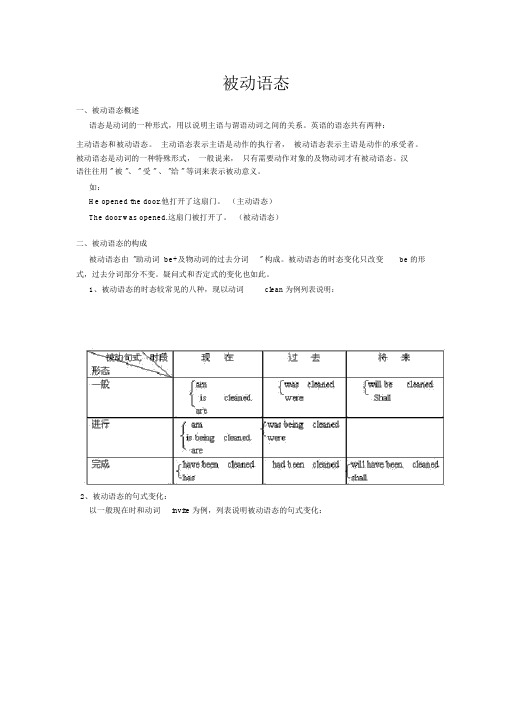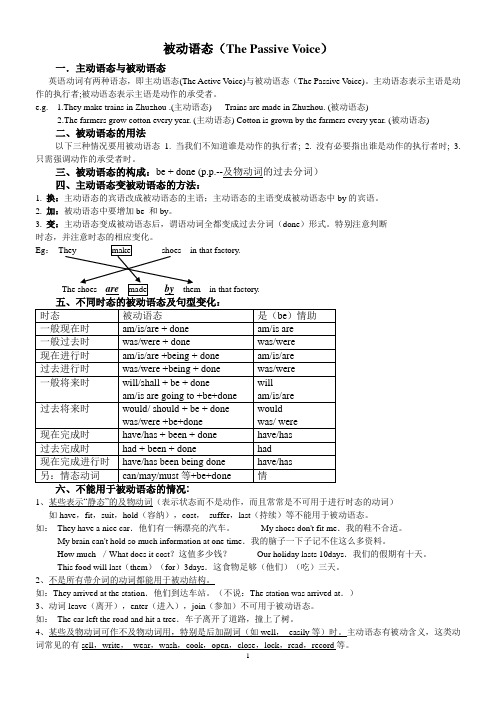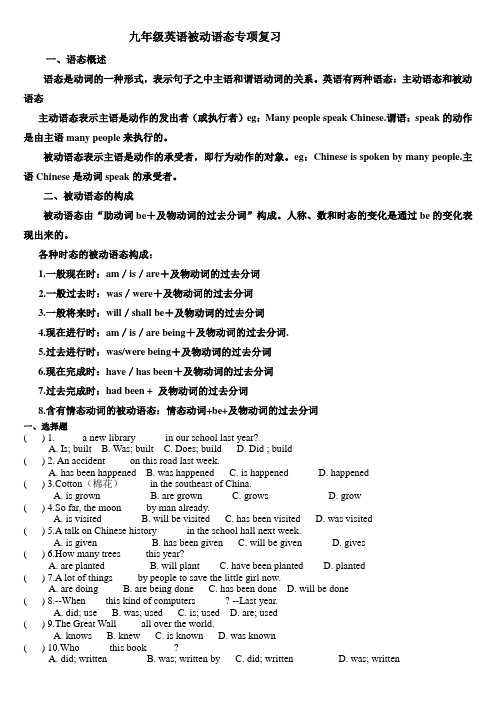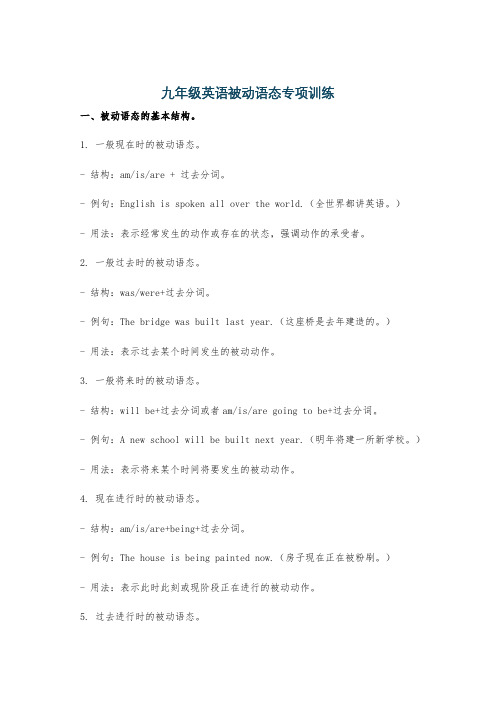初三被动语态专项复习完整版
九年级英语语法被动语态专题复习.docx

被动语态一、被动语态概述语态是动词的一种形式,用以说明主语与谓语动词之间的关系。
英语的语态共有两种:主动语态和被动语态。
主动语态表示主语是动作的执行者,被动语态表示主语是动作的承受者。
被动语态是动词的一种特殊形式,一般说来,只有需要动作对象的及物动词才有被动语态。
汉语往往用 " 被 "、 " 受 " 、 "给 " 等词来表示被动意义。
如:He opened the door.他打开了这扇门。
(主动语态)The door was opened.这扇门被打开了。
(被动语态)二、被动语态的构成被动语态由 "助动词 be+及物动词的过去分词" 构成。
被动语态的时态变化只改变be 的形式,过去分词部分不变。
疑问式和否定式的变化也如此。
1、被动语态的时态较常见的八种,现以动词clean 为例列表说明:2、被动语态的句式变化:以一般现在时和动词invite 为例,列表说明被动语态的句式变化:3、含有情的被情的被构:情+be+去分;其及句型的化由情完成, "be+去分 "部分不。
如:Tables can be made of stone.桌子可由石制造。
Tables could be made of stone at that time. 那时桌子可由石头制造。
(一般过去时)Can tables be made of stone? 桌子能用石制造?(疑句)三、主被示:1、主被的步:(1)将主句的主:注意:如果主句的是代,需将其由格主格。
如:Tom killed him.→ He was killed by Tom.(2)将改 "be+去分 " 。
注意:They held a meeting yesterday. → A meeting was held by them yesterday.他昨天开会了。
(全面版)初中被动语态解析与练习

全面版)初中被动语态解析与练习一、被动语态的概念被动语态是英语中的一种动词形式,用于表示主语是动作的承受者而非执行者的句子。
其结构为:be动词] + [及物动词的过去分词]如:am/is/are/was/were/been + 过去分词)被动语态可以强调动作的接受者,不关注动作的执行者。
在写作中,使用被动语态可以增加句子的变化和丰富性。
二、被动语态的用法1.表示动作的接受者被动语态常用于强调主语是动作的接受者。
例如。
主动语态:___.被动语态:I was ___.2.隐藏动作的执行者当执行者无关紧要或不需要强调时,被动语态可以隐藏动作的执行者。
例如:主动语态:___.被动语态:A ___ was built last month.3.客观事实陈述被动语态常用于客观陈述事实,不强调执行者或承受者。
例如:主动语态:People speak English all over the world.被动语态:English is spoken all over the world.三、被动语态的变化规则和注意事项被动语态的变化规则如下:一般现在时:am/is/are + 过去分词一般过去时:was/were + 过去分词一般将来时:will be + 过去分词现在进行时:am/is/are being + 过去分词需要注意的是:当主动句中有宾格时,被动句需要使用介词"by"来表示动作的执行者。
例如:The book ___.一些特殊动词以及某些及物动词不适用被动语态,需要注意区分。
四、被动语态的练习请将下列句子转换为被动语态:1.They have built a new bridge in the city.2.She will write a letter to her ___.3.___.4.We can solve this problem easily.5.___.参考答案:1.A new bridge has been built in the city.2.___ will be written to her mother by her.3.___ to the students by the ___.4.This problem can be solved easily.5.I ___.以上是被动语态的解析和练习内容,希望能帮助你更好地理解和运用被动语态。
初三英语中考被动语态专项复习

被动语态(The Passive Voice)一.主动语态与被动语态英语动词有两种语态,即主动语态(The Active V oice)与被动语态(The Passive V oice)。
主动语态表示主语是动作的执行者;被动语态表示主语是动作的承受者。
e.g. 1.They make trains in Zhuzhou .(主动语态) Trains are made in Zhuzhou. (被动语态)2.The farmers grow cotton every year. (主动语态) Cotton is grown by the farmers every year. (被动语态)二、被动语态的用法以下三种情况要用被动语态1. 当我们不知道谁是动作的执行者; 2. 没有必要指出谁是动作的执行者时; 3. 只需强调动作的承受者时。
三、被动语态的构成:be + done (p.p.--及物动词的过去分词)四、主动语态变被动语态的方法:1. 换:主动语态的宾语改成被动语态的主语;主动语态的主语变成被动语态中by的宾语。
2.加:被动语态中要增加be 和by。
3. 变:主动语态变成被动语态后,谓语动词全都变成过去分词(done)形式。
特别注意判断时态,并注意时态的相应变化。
Eg:in that factory.如:His new novel is selling well.他的新小说很畅销。
The cloth washes well.这布很耐洗。
This material won't wear.这种材料不耐穿。
His play won't act.他的戏剧不会上演。
The window won't shut.这窗关不上。
The door won't open.这门打不开。
The door won't lock.这门锁不上。
This poem reads well.这首诗读来很好。
初三被动语态专项复习

初三被动语态专项复习被动语态专项复一、语态是动词的一种形式,用来说明句中主语和谓语动词的关系。
如果主语是动词的执行者,则使用主动语态,如果主语是动作的承受者,则使用被动语态。
主动语态变被动语态主动语态:XXX XXX.被动语态:The window was broken by the boy XXX.被动语态的构成:1)肯定句:主语+be +过去分词(+by…)例如:XXX.2)否定句:主语+be not+过去分词(+by…)例如:This road is not used very often.3)一般疑问句:Be+主语+过去分词(+by…)?例如:Is that bridge built over the Changjiang River?4)特殊疑问句:疑问词+ be+主语+过去分词(+by…)?例如:When was XXX invented?被动语态需要注意人称,时态和数的变化。
二、被动语态的特殊情况当动词(表示主语的属性特征)+副词:(XXX…)与相应的副词连用的时候用主动表被动。
此类动词有:write。
sell。
clean。
wash等词做不及物动词时,例如:1)这种食物尝起来好卖的也好。
XXX.2)这支笔写的很糟/流畅。
XXX.3)这家商店八点营业。
The shop opens at 8 a.m.Ⅰ。
want/need+ doing相当于want/need+ to be done你的衣服需要洗。
XXX.XXX.Ⅰ.在XXX中,doing表被动意义This book is worth reading.XXX.2.see。
hear。
make等动词后作宾补的不定式都不带to;但改成被动语态后必须带to。
The boss made him work all day.He was made to work all day (by the boss).I often hear her sing this song.She is often heard to sing this song (by me).3.动词短语变为被动语态时,不能丢掉动词后的介词或副词。
(word完整版)新目标九年级英语被动语态专项复习练习题及答案

九年级英语被动语态专项复习一、语态概述语态是动词的一种形式,表示句子之中主语和谓语动词的关系。
英语有两种语态:主动语态和被动语态主动语态表示主语是动作的发出者(或执行者)eg:Many people speak Chinese.谓语:speak的动作是由主语many people来执行的。
被动语态表示主语是动作的承受者,即行为动作的对象。
eg:Chinese is spoken by many people.主语Chinese是动词speak的承受者。
二、被动语态的构成被动语态由“助动词be+及物动词的过去分词”构成。
人称、数和时态的变化是通过be的变化表现出来的。
各种时态的被动语态构成:1.一般现在时:am/is/are+及物动词的过去分词2.一般过去时:was/were+及物动词的过去分词3.一般将来时:will/shall be+及物动词的过去分词4.现在进行时:am/is/are being+及物动词的过去分词.5.过去进行时:was/were being+及物动词的过去分词6.现在完成时:have/has been+及物动词的过去分词7.过去完成时:had been + 及物动词的过去分词8.含有情态动词的被动语态:情态动词+be+及物动词的过去分词一、选择题( ) 1._____ a new library _____ in our school last year?A. Is; builtB. Was; builtC. Does; buildD. Did ; build( ) 2. An accident ____ on this road last week.A. has been happenedB. was happenedC. is happenedD. happened( ) 3.Cotton(棉花)____ in the southeast of China.A. is grownB. are grownC. growsD. grow( ) 4.So far, the moon ____ by man already.A. is visitedB. will be visitedC. has been visitedD. was visited( ) 5.A talk on Chinese history _____ in the school hall next week.A. is givenB. has been givenC. will be givenD. gives( ) 6.How many trees ____ this year?A. are plantedB. will plantC. have been plantedD. planted( ) 7.A lot of things ____ by people to save the little girl now.A. are doingB. are being doneC. has been doneD. will be done( ) 8.--When ___ this kind of computers______? --Last year.A. did; useB. was; usedC. is; usedD. are; used( ) 9.The Great Wall ____ all over the world.A. knowsB. knewC. is knownD. was known( ) 10.Who _____ this book _____?A. did; writtenB. was; written byC. did; writtenD. was; written( ) 11.A story _____ by Granny yesterday.A. was told usB. was told to usC. is told usD. told us( ) 12.The monkey was seen _____ off the tree.A. jumpB. jumpsC. jumpedD. to jump( ) 13.The school bag ___ behind the chair.A. putsB. can be putC. can be puttedD. can put( )14.Older people ____ well.A. looks afterB. must be looked afterC. must look afterD. looked after ( )15.Our teacher ______ carefully.A. should be listened toB. should be listenC. be listenedD. is listened( ) 16. Rubbish _______ into the river in order to protect the environment.A. must throwB. mustn’t be thrownC. can’t be thrownD. may be thrown( ) 17.. After the lights ________, we left the classroom.A. turned offB. is turned offC. were turnedD. were turned off( ) 18.. When the accident _________, we were going by the hospital.A. take placeB. were taken placeC. were happenedD. happened( ) 19.. A knife _______ cut things, like apples, water melons.A. is used toB. is used forC. used toD. use to( ) 20.. Mr Zhang _______ eating Shandong food now.A. was usedB. is used toC. used toD. will be used for( ) 21. Just now Tom was seen ______ with James.A. to fight.B. fightingC. fightD. fought.( ) 22.. The broken chairs need _______ at once.A. repairedB. to be repairedC. being repairedD. repair( ) 23. ______ my TV _______ here ?A. Can, be repairedB. Is , can repairedC. Can, repairedD. Can, repair ( ) 24. When _____ the bridge ______ ?A. did, buildB. was, builtC. did, setD. was, build( ) 25. _____ many polluted things _______ out of the city yet?A. Are, being movedB. Have, been movedC. Have, movedD. Did, move ( ) 26.. _____ the floor ______ by the students on duty at the moment?A.Are, cleanedB. Is, sweptC. Is, being sweptD. Does, sweep二、用括号内所给动词的正确形式填空。
九年级英语被动语态专项训练

九年级英语被动语态专项训练一、被动语态的基本结构。
1. 一般现在时的被动语态。
- 结构:am/is/are + 过去分词。
- 例句:English is spoken all over the world.(全世界都讲英语。
)- 用法:表示经常发生的动作或存在的状态,强调动作的承受者。
2. 一般过去时的被动语态。
- 结构:was/were+过去分词。
- 例句:The bridge was built last year.(这座桥是去年建造的。
)- 用法:表示过去某个时间发生的被动动作。
3. 一般将来时的被动语态。
- 结构:will be+过去分词或者am/is/are going to be+过去分词。
- 例句:A new school will be built next year.(明年将建一所新学校。
)- 用法:表示将来某个时间将要发生的被动动作。
4. 现在进行时的被动语态。
- 结构:am/is/are+being+过去分词。
- 例句:The house is being painted now.(房子现在正在被粉刷。
)- 用法:表示此时此刻或现阶段正在进行的被动动作。
5. 过去进行时的被动语态。
- 结构:was/were+being+过去分词。
- 例句:When I called him, the work was being done.(当我给他打电话时,工作正在被做。
)- 用法:表示过去某个时刻或某段时间正在进行的被动动作。
6. 现在完成时的被动语态。
- 结构:have/has+been+过去分词。
- 例句:Many trees have been planted in our school.(我们学校已经种了很多树。
)- 用法:表示过去发生的动作对现在造成的影响或结果,强调动作的承受者。
二、被动语态的用法。
1. 不知道动作的执行者是谁?- 例如:My bike was stolen yesterday.(我的自行车昨天被偷了。
(word完整版)中考被动语态精讲精练

初中被动语态精讲精练一、语态:英语动词有两种语态:主动语态和被动语态。
主动语态表示主语是动作的执行者。
如:He wrote the novel. People grow rice in the south of China。
被动语态表示主语是动作的承受者.如:The novel was written by him. Rice is grown in the south of China。
二、主动语态和被动语态的转换1.一般情况下,主动语态变被动语态1).把原句的宾语改成主语,若主动句中的宾语是人称代词,要将宾格变成主格。
2)把原句的主语变宾语,若主动句中的主语是人称代词,要将主格变成宾格,用by引出来.3) 谓语动词变成相应的被动形式。
人们说英语.People speak English in many countries。
英语被说。
English is spoken in many countries..我们造这座桥.We built this bridge last year。
这座桥被建造。
This bridge was built last year.三、各个时态的被动语态的结构初中英语教材中出现了8种时态的被动语态及带有情态动词的被动语态。
1.一般现在时: do/does—-—am/is/are doneWe clean the classroom.-——--Our classroom is cleaned every day。
Many countries speak English。
-—— _____________________________________We clean our classroom every day。
-—-________________________________________Does you plant many trees every year?-—- _____________________________________2。
中考英语专题复习 被动语态专项复习

The car w__a_s_ r_e_p_a_ir_e_d_by the man yesterday.
3.The city will build the new bank next year. The new bank _w__il_l _ _b_e__ b_u_i_lt___next year.
(2)谓语动词变为相应的被动形式。(be done)
(3)把主动句中的主语变为被动句中的宾语,主格变宾 格,并由by引导。
不同时态被动语态的构成:
1. We plant trees every spring. Trees are planted (by us) every spring. 一般现在时: am/is /are + done
主动语态变被动语态的方法:
I
speak
English
主动语态:动作执行者+谓语动词的主动形式+动作的承受者
English
is spoken
by me
被动语态:动作的承受者+谓语动词的被动形式+by+动作执行者
说明(1)要将主动语态中的宾语变为被动语态的主语。 (若主动句中的宾语为人称代词,要将宾格变为主格)。
师友组总结这样的词
make sb. do
be made to do
let sb. do 被动 be l Nhomakorabeat to do
主动 see sb. do
sb be seen to do
hear sb. do
be heard to do
watch sb. do
Be watched to do
- 1、下载文档前请自行甄别文档内容的完整性,平台不提供额外的编辑、内容补充、找答案等附加服务。
- 2、"仅部分预览"的文档,不可在线预览部分如存在完整性等问题,可反馈申请退款(可完整预览的文档不适用该条件!)。
- 3、如文档侵犯您的权益,请联系客服反馈,我们会尽快为您处理(人工客服工作时间:9:00-18:30)。
初三被动语态专项复习 Document serial number【NL89WT-NY98YT-NC8CB-NNUUT-NUT108】被动语态专项复习一、1.含义:语态是动词的一种形式,用来说明句中主语和谓语动词的关系。
如果主语是动词的执行者,则使用__________语态,如果主语是动作的承受者,则使用____________语态。
2.主动语态变被动语态主动语态:Theboybrokethewindowyesterday.动作执行者动词主动形式动作承受者被动语态:Thewindowwasbrokenbytheboyyesterday.动作承受者动词被动形式动作执行者3.构成:(1)肯定句:主语+be+过去分词(+by…)英语被许多人说。
English_____________________________________manypeople.(2)否定句:主语+benot+过去分词(+by…)这条路不经常被使用。
Thisroad________________________veryoften.(3)一般疑问句:Be+主语+过去分词(+by…)那座桥是被建在长江上吗___________thatbridge_____________overtheChangjiangRiver(4)特殊疑问句:疑问词+be+主语+过去分词(+by…)电话是什么时候被发明的___________________________thetelephone_______________被动语态(二)二、被动语态的特殊情况Ⅰ.动词(表示主语的属性特征)+副词:(well/badly/easily…),当他们与相应的副词连用的时候用主动表被动。
此类动词有:write,sell,clean,wash等词做不及物动词时,如:Thebooksellswell.(1)这种食物尝起来好卖的也好.Thisfoodtastes_______and________well.(2)这支笔写的很糟/流畅.Thispen________badly/smoothly.(3)这家商店八点营业.Theshop_________at8a.m.Ⅱ.want/need+doing相当于want/need+tobedone你的衣服需要洗。
Yourclothesneed__________.=Yourclothesneed______________________.Ⅲ.在beworthdoing中,doing表被动意义Thisbookisworth_____________.(read)Thisstampisworth_____________.(collect)2.see,hear,make等动词后作宾补的不定式都不带to;但改成被动语态后必须带to。
Thebossmadehimworkallday.He___________________________allday(bytheboss). Ioftenhearhersingthissong.She_____often_________________________thissong(byme).3.动词短语变为被动语态时,不能丢掉动词后的介词或副词。
Shetakescareofthebabyeveryday.Thebaby__________________________byhereveryday. Peopleshouldspeaktotheoldpolitely.Theold_______________________politelybypeople.()Thisdictionarymustn’t________________thelibrary.A.takeawayB.betakenawayC.betakenawayfrom4.用于词组的被动语态.常用于表示"据说"或"相信",如:Itissaidthat...(据说...)Itisreportedthat…(据报道...)Itiswell-knownthat…(众所周知)5.含双宾语的主动结构变为被动结构时(1)Hetoldusastory.→_______were_______astoryby________.(2)用介词to或for引导Hetoldusastory.→___________________told_______usbyhim.Hermothergaveheranewpen.→Anewpen________________________herbyhermother.注意:填介词(to/for)explain/bring/give/lend/offer/pass/sell/send/show/take/teach/tell/write/return/serves th______sb.design/build/buy/cook/do/draw/make/order/choose/find/get/preparesth________sb.6.不用于被动语态的情况:(1)不及物动词无被动语态.如:appear,die,end,fail,happen,sit,stand,cometrue,fallasleep,takeplace等。
()Greatchanges___inthelastthreeyears.A.havetakenplaceB.havebeentakenplaceC.havehappened昨天这个城镇发生了一场事故.Anaccident____________inthistownyesterday.(2)系动词无被动语态.如:Itsoundsgood.另:be,become,feel,get,grow,keep,look,seem,smell,stay,turn等。
被动语态专项习题练习:一、用括号中动词被动结构的适当形式填空。
二、1.English_______________widely__________________(use)intheworld.三、2.She_________________(fall)illlastnight,andshe_______________(take)tothehospital atonce.四、3.TheGreatWall____________________(know)allovertheworld.五、4.Threechildren____________________(take)goodcareofbythenurse.六、5.Somenewhouses_________________(build)bythevillagersthemselves.七、6.Whatlanguage____________________(speak)inJapan八、7.Theblackbike_____________________(buy)inthatshopthreedaysago.九、8.Thebigtree_____________________(blow)downinthestormlastnight.十、puterscience__________________(teach)nowalmostinalluniversitiesandinstitutes.十一、10.Thefirstrailwayintheworld_______________________(design)inthelastcentury.十二、11.Thewindow_________________(notbreak)bytheboyjustnow.十三、12.Visitors_____________________(ask)nottotouchtheexhibits(展览品).十四、13.Abeautifulhorse___________________(draw)byJohnyesterday.14.Thepictures________________(take)byJacktomorrow.15.Schoolfootballgame__________________(hold)lastFridayevening.16.Anumberofthetrees______________(plant)aroundDalianeveryyear.17.Thisbook________________(write)forChinesechildrenatthattime.18.He______________(invite)tothepartybyhisfriendslastMonday.19.Thesportmeeting__________________(hold)nextFriday.二、单选()1._____anewlibrary_____inourschoollastyear?A.Is;builtB.Was;builtC.Does;buildD.Were,built()2.Anaccident____onthisroadlastweek.A.washappenedB.ishappenedC.happenedD.washappening()3.Cotton____inthesoutheastofChina.A.isgrownB.aregrownC.growsD.grow()4.AtalkonChinesehistory_____intheschoolhallnextweek.A.isgivenB.hasbeengivenC.willbegivenD.willgiven()5.ThousandsoftouristscometoEdinburghtoseenewfilmsandplaysandhearmusic______byfamous musicians.A.toplayB.playedC.playingD.wasplayed()6.—Theword“OK”,whichisthemostpopularandcommonexpressionintheworld,_______firstinlateMarch,1893.---______!Ithasahistoryof175years.ed,AmazingB.wasused,AmazingC.wasused,Amazedes,Amazing()7.Yourshoes____.Youneedanewpair.A.wearoutB.wornoutC.arewornoutD.wearsout()8.Itisreportedthatmoreteachingbuildings_____________inourschoolnextterm.A.willbebuiltB.willbuildC.wasbuiltD.built()9.Mary____showmehernewdictionaryjustnow.A.hasaskedtoB.wasaskedtoC.isaskedD.asked()10.Themonkeywasseen_____offthetree.A.jumpB.jumpedC.tojumpD.jumping()11.He_____________somepiecesofadvice,buthe__________tothem.A.gave,didn’tlistenB.wasgiven,wasn’tlistenedC.wasgiven,didn’tlistenD.gives,doesn’tlisten()12.Astrangething___inourschoolyesterday.A.washappenedB.hasbeenhappenedC.happenedD.happens()13.Jimwasn’tatschoolbecausehe_________tostayathome.A.istoldB.toldC.wastoldD.willbetold()14.Theteachertoldhisstudentsthatthey____tobeusefulmentothecountry.A.wereallexpectedB.wereallexpectingC.allwereexpectedD.expected()15.___________thatSusancan’tgotothepartybecauseshe_______________.A.It’ssaid,didn’tinviteB.It’ssaid,wasn’tinvitedC.Iwastold,wasn’tinvitedD.It’ssa id,doesn’tinvite.()16.–WhathappenedtoBilly?–He__________becauseofhisdrink-driving.A.hascaughtB.iscaughtC.wascaughtD.catches()17.I’mgladtofindthatmanytrees________inourcitylastyear.A.areplantedB.plantedC.wereplantedD.wereplanting()18.Metal___________makingmachinesandmanyotherthings.A.isusedforB.isusedasC.isusedtoD.isused。
